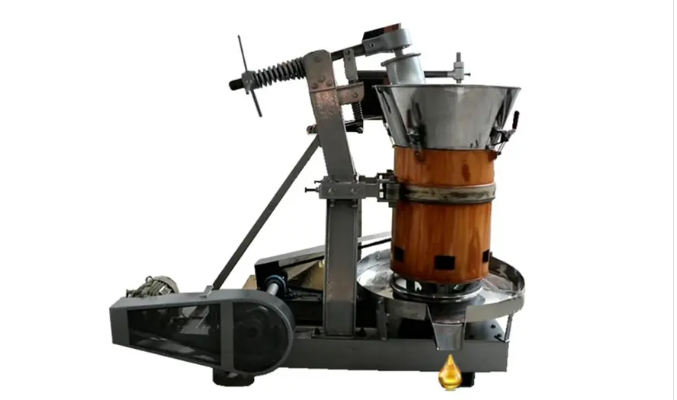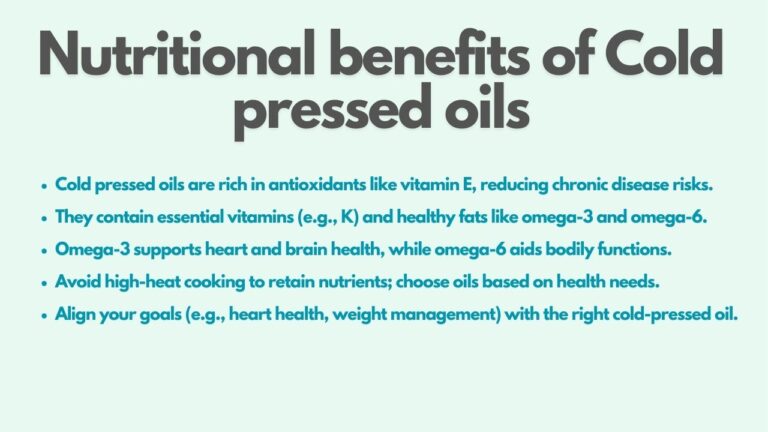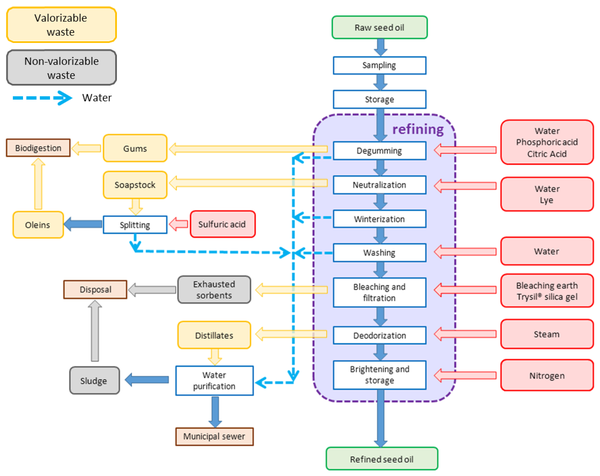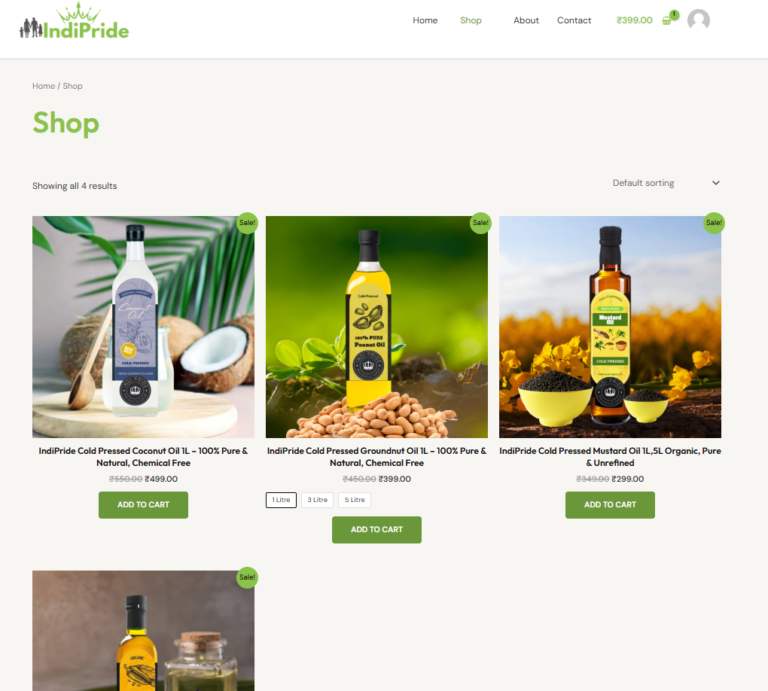These days, everyone is paying more attention to what they eat, and that’s a GOOD thing. Cooking oils, in particular, have become a focal point of this health-conscious trend because cooking oils are essential in preparing most of our food.
Cold Pressed Oil Vs Refined Oil – Which Is Best For Your Cooking And Health? This question has been on the minds of many, as understanding the difference between these oils can guide healthier cooking choices.
You might also be worried about processed foods, losing nutrients when food is processed, and how certain fats can affect your health.
If you are probably looking into the difference between Cold pressed and refined oils, this guide is here to make you understand which is best for you and your family.
Let’s get into the explanation of cold pressed oil vs refined oil, how these oils are made, what the nutrients different types of cooking oils contain, and how best to use them, so you can be aware about what you are eating.
Cold Pressed Oil Vs Refined Oil - What are Cold Pressed Oils?
Cold pressed oils are extracted by pressing oil-rich seeds or nuts and forcing out the liquid.
The key difference between cold pressed oil vs refined oil lies in its EXTRACTION PROCESS.
WHILE EXTRACTING, IT’S DONE WITHOUT EMITTING HEAT OR ADDING CHEMICALS.
This heatless process helps the oils retain their natural flavor, aroma, and nutritional value.
Common types of cold pressed oils in the market include
Olive oil
Avocado oil
Sun-Flower oil
Many of you wonder why Cold pressed oils are very expensive than regular oil/refined oil?
The answer is that the Cold pressing method yields less oil compared to refining processes.
Here you may have a question “Why cold pressed oil yield less oil?”
It is because, the Cold pressed oils rely on MECHANICAL PRESSURE alone, without the use of heat or chemicals to extract the oil from seeds, nuts, or fruits.
The mechanical press can only extract a certain amount of oil from the raw materials. Some oil remains trapped in the solid residue (often called the “cake”).
In Refined oil, The heat helps in breaking down the cells of the raw materials. So, breaking it down is easier to extract more oil. Since Cold pressing avoids heat, it can’t extract as much oil.
The goal of Cold pressing is to maintain the natural flavor, aroma, and nutritional value of the oil. So, if we would use heat or chemicals to increase the yield of the Cold pressed oils, it would compromise these benefits.
When considering Cold pressed oil vs refined oil, many people prefer Cold pressed oils despite their higher cost due to several potential health benefits like
Nutritional value – Vitamins, Minerals and antioxidants and essential fatty acid
No chemical residues
Natural Flavour and Aroma
Health benefits of heart health, reducing inflammation, etc
You should also prefer to use Cold pressed oil in your daily food preparation at least 2 teaspoons/per person/ per meal.
What is the Extraction Process of Cold pressed oils?

As we discussed above, Cold pressing is a mechanical extraction method that uses pressure to extract oil from seeds, nuts, or fruits.
Imagine you are squeezing an orange by hand. This is the basic principle but you are squeezing an orange just on a larger scale and with specialized machines.
The extraction process typically involves
First CLEANING and PREPARING
The raw materials (like seeds or nuts) are cleaned to remove impurities like dirt, dust, and debris that can affect the taste, aroma, and clarity of the oil. Sometimes, they might be lightly crushed or ground to increase the surface area for pressing.
So, why cleaning the impurities of raw material of seeds or nuts is important? Because
Impurities can harbor harmful microorganisms like bacteria, mold, and fungi. These microorganisms can introduce toxins or pathogens into the oil during extraction, posing a significant health risk to consumers.
For example, some molds produce mycotoxins, which are highly toxic compounds. Similarly, bacteria like E. coli or Salmonella can cause foodborne illnesses.
Clean raw materials improve the efficiency of the extraction process. Larger debris like stones or sticks can damage the pressing equipment itself, leading to costly repairs and downtime. Finer particles like dust and dirt can clog the machinery, reducing the pressure applied during pressing and resulting in a lower oil yield.
Oil extracted from clean raw materials is less likely to spoil or degrade quickly. Impurities can accelerate the oxidation process of the oil. Oxidation occurs when oil is exposed to oxygen, leading to rancidity, off-flavors, and a decrease in nutritional value.
Mechanical Pressing
The prepared seeds or nuts are then placed in a press (Cold pressed oil machine), which applies high pressure (not high heat) to crush them. This high pressure forces the oil to flow out.
Filtration – The extracted oil is then filtered to remove any remaining solid particles.
Packing – Finally, the filtered oil is packed by the manufacturers. It is usually bottled and sealed to maintain its freshness and quality. The oil is now ready to be shipped to stores and customers.
Please Note – Cold pressed oils in glass containers are usually the preferred choice. Glass containers protect the oil better from light and air. Plus, it helps to maintain the flavor, aroma, and nutritional value of the Cold pressed oil.
However, if you are going to consume the oil quickly and store it properly, then you can choose the plastic container.
What are the Nutritional Benefits of Cold Pressed Oils?

If you are wondered the nutritional benefits of Cold pressed oils, here are these
Key Nutrients
Cold pressed oils are rich in antioxidants like vitamin E which protect cells from damage caused by free radicals. This antioxidant protection is linked to a reduced risk of chronic diseases.
Depending on the source material used to prepare the Cold pressed oils (seeds, nuts, or fruits), these oils can contain various vitamins, such as vitamin K and others. These contribute to overall health and specific bodily functions.
These oils are excellent sources of healthy fats, including essential fatty acids like omega-3 and omega-6. Omega-3s are known for their anti-inflammatory properties and benefits for heart and brain health, while omega-6s are also essential for various bodily functions. Specific examples include alpha-linolenic acid (ALA) in flaxseed oil (omega-3) and linoleic acid (LA) in sunflower oil (omega-6).
Are Cold Pressed Oils Healthier?
In the debate of Cold pressed oil vs refined oil, while Cold pressed oils generally contain more natural nutrients, it is essential to understand that what is considered “HEALTHIER” can vary.
Healthier depends on several factors,
How you use the oil matters. High-heat cooking can damage even Cold pressed oils.
Dietary needs and health conditions vary. Some oils might be more suitable for certain individuals than others.
The nutritional profile varies significantly between different oils (e.g., flaxseed oil vs. olive oil).
First, identify your health goals like heart health, skin health, weight management, Immune support, Digestive health, Anti-Inflammatory Properties, and Antioxidant Protection. Then, choose the right Cold pressed oil that aligns with those needs. This approach will help you maximize the health benefits of Cold pressed oils.
What are Refined Oils?
In the context of Cold pressed oil vs refined oil, refined oils are mainly processed to improve certain characteristics like yield, shelf life, and cooking performance
Refined oils – Series of Chemical and physical processes.
Cold pressed oils – Completely mechanical process.
Common examples of refined oils include
Vegetable oil (often a blend of different oils)
Canola oil
Soybean oil
Sunflower oil
Corn oil
Rice Bran oil
Many of you wonder why oils are refined in the first place compared to Cold pressed oils. The primary goals of refining are
The refining process extracts more oil from the source material than cold pressing so it increases the yield and is cost-effective.
Refining removes impurities that can cause spoilage, thus increasing the oil’s shelf life (Can last for 1 to 2 years or even longer) but Cold pressed oils (can last 6 months to 1 year if stored properly (cool, dark place, airtight container)).
Refining removes strong flavors and aromas. So, it is suitable for various cooking applications.
Refined oils can be heated to higher temperatures before they start to smoke and decompose. This characteristic makes them suitable for cooking methods that require high heat, like frying, deep-frying, and stir-frying.
While refining offers these advantages, it is important to note that some nutrients can be lost during the process. So, if you value the nutritional benefits, it is best to choose Cold pressed oils. Cold pressed oils offer many benefits.
The Extraction Process of Refined Oils

Refining is a multi-step process used to extract and purify oils. This results
Neutral flavor
Extended shelf life
High smoke point
Extraction of Cold pressed oils is simple from the refined oil which involves several key steps
Solvent Extraction: After squeezing the seeds or nuts to get the oil, there is still some oil left. So, the manufacturers use chemical solvents, like hexane to get the remaining oil out. This way, more oil is extracted compared to Cold pressed oils.
Degumming: This step removes sticky substances and certain fats that can make the oil cloudy and spoil quickly.
Neutralization: In this step, a substance like sodium hydroxide is used to neutralize free fatty acids. These acids can cause the oil to taste bad and go rancid quickly.
Bleaching: Special clays or other materials are used to remove colors from the oil, making it lighter and more appealing to the users.
Deodorization: High heat and steam are used to get rid of any unwanted smells and flavors so the refined oil comes with a neutral taste and scent.
Potential downsides of refining
While refining offers advantages, it also has potential drawbacks
Loss of natural nutrients and antioxidants
Potential formation of trans fats. But, please note modern refining processes are less likely to produce significant amounts of trans fats.
Formation of harmful compounds
Cold Pressed Oil vs Refined Oil - A Detailed Comparision Table
| Feature | Cold Pressed Oil | Refined Oil |
|---|---|---|
| Extraction Method |
Mechanical pressing; no heat or chemicals used. Clarification: The oil is extracted by crushing seeds/nuts/fruits. Expeller pressing generates heat due to friction but is still considered cold pressing when temperatures are kept low. |
Chemical solvents (e.g., hexane), high heat, bleaching, deodorizing. Clarification: Processes maximize yield and create consistency. Solvents like hexane are mostly removed but traces may remain. Bleaching removes color; deodorizing removes odors and flavors. |
| Nutrient Retention |
High; retains natural antioxidants (e.g., vitamin E), vitamins, and healthy fats (omega-3, omega-6). Clarification: Nutrient levels vary by source. Cold pressing preserves more natural nutrients compared to refining. |
Lower; some nutrients and antioxidants lost due to heat and processing. Clarification: Refined oils typically have fewer beneficial compounds than cold-pressed oils. |
| Flavor & Aroma |
Retains the natural flavor and aroma of the source material. Clarification: This can be a pro or con depending on preference. |
Neutral flavor and aroma due to deodorization. Clarification: Versatile for cooking without imparting strong flavors. |
| Color |
Retains natural color, varying by source. Clarification: Ranges from deep green (olive oil) to golden yellow (sunflower oil). |
Lighter, uniform color due to bleaching. Clarification: Creates visually consistent products. |
| Smoke Point |
Lower; not ideal for high-heat cooking. Clarification: Best for low-heat cooking, salad dressings, or finishing dishes. |
Higher; suitable for high-heat cooking like frying. Clarification: Avoid overheating to prevent harmful compound formation. |
| Shelf Life |
Shorter due to natural compounds degrading over time. Clarification: Store in a cool, dark place to prevent rancidity. Shelf life: 6 months to 1 year. |
Longer due to impurity removal. Clarification: More stable and longer shelf life. Shelf life: Up to 2 years or more. |
| Yield |
Lower yield of oil extracted. Clarification: Often more expensive. |
Higher yield of oil extracted. Clarification: More cost-effective. |
| Potential Downsides |
Can degrade at high temperatures; shorter shelf life. Clarification: Use appropriately to avoid issues. |
Nutrient loss; potential harmful compounds at high processing temperatures. Clarification: Modern processes are safe, but some avoid refined oils. |
| Impact on Health |
Rich in nutrients with potential health benefits. Clarification: Offers anti-inflammatory, heart health, and antioxidant protection benefits. |
Provides essential fatty acids but fewer antioxidants. Clarification: Suitable for high-heat cooking but less nutritious. |
| Cost |
Generally more expensive. Clarification: Reflects higher production costs. |
Generally less expensive. Clarification: Reflects higher yield and efficient processing. |
| Storage |
Store in a cool, dark place, preferably in a dark glass bottle. Refrigeration recommended for some oils. | Store in a cool, dark place. |
How to Choose the Right Oils for Your Needs (Cold Pressed Oil Vs Refined Oil)?

Choosing the right cooking oil between Cold Pressed Oil Vs Refined Oil can be confusing, especially with the variety of options available.
Many people often wonder which oil (Cold pressed oil vs refined oil) is best for which purpose and how to balance health benefits with cooking needs.
Let’s see a breakdown (Cold pressed oil vs refined oil) that help you choose,
1. Consider Your Cooking Method
High-Heat Cooking (frying, deep-frying, stir-frying, searing): You need a refined oil with a high smoke point. Suitable options include
Refined Avocado Oil
Refined Sunflower Oil
Refined Canola Oil
Refined Vegetable Oil
Refined Peanut Oil
Why refined oil? These oils can withstand high temperatures without breaking down, ensuring safe and flavorful cooking.
Medium-Heat Cooking (sautéing, baking): You have more flexibility here. Some refined oils and some Cold pressed oils with higher smoke points can work
Refined Olive Oil (has a higher smoke point than extra virgin)
Cold pressed Avocado Oil (has a relatively high smoke point for a Cold pressed oil)
Low-Heat or No-Heat Cooking (salad dressings, dips, finishing dishes): This is where Cold pressed oils shine. You can fully enjoy their flavor and nutritional benefits without the risk of degradation
Extra Virgin Olive Oil
Flaxseed Oil
Walnut Oil
Pumpkin Seed Oil
Why Cold pressed? You preserve the maximum flavor, aroma, and nutrients.
2. Consider Your Health Priorities
If you prioritize nutrients like antioxidants and essential fatty acids, incorporate Cold pressed oils into your diet through low-heat cooking or as finishing oils.
If you prefer to minimize highly processed foods, consider limiting refined oils and focusing on cooking methods that allow you to use Cold pressed oils.
Is Cold Pressed Oil Better for Cooking Than Refined Oil?
Not always. Cold pressed oils are generally healthier due to their higher nutrient content, but they have a lower smoke point. This means they break down and can produce harmful compounds when heated to high temperatures.
Therefore
For high-heat cooking (frying, deep-frying, stir-frying): Refined oils are the better choice. Their higher smoke point makes them more stable at high temperatures.
For low-heat cooking (sautéing at low temperatures, gentle simmering), salad dressings, dips, and finishing dishes: Cold pressed oils are preferable, as you can benefit from their flavor and nutrients without risking degradation.
Using Cold Pressed Oil for Cooking
If you choose to use Cold pressed oils for cooking, here are some important tips:
Avoid high temperatures and prolonged cooking times.
If the oil starts to smoke, it is getting too hot and is likely breaking down. Discard it and start again at a lower temperature.
Drizzling Cold pressed oil over a finished dish (like a salad or roasted vegetables) is a great way to add flavor and nutrients without heating the oil.
Some Cold pressed oils are more stable at slightly higher temperatures than others. For example, olive oil has a relatively higher smoke point among Cold pressed oils.
Where Can You Find Cold Pressed Oils in India?

When it comes to choosing cold pressed oils for your family, it is important to look beyond just the label.
Many manufacturers cut corners that can compromise the quality and nutritional value of their oils.
Here is why IndiPride stands apart
Many brands may claim “Cold pressed” but use methods that generate excessive heat, degrading the oil’s quality. IndiPride is committed to traditional Cold pressing methods, ensuring minimal heat exposure and maximum nutrient retention.
The quality of the oil starts with the QUALITY OF SEEDS. Some manufacturers use lower-grade or chemically treated seeds (because it is less expensive). IndiPride sources high-quality seeds, ensuring a pure and natural final product.
Sadly, some oils on the market are adulterated with cheaper oils or chemicals. IndiPride maintains strict quality control measures to guarantee the purity of their oils.
Exposure to light and air can degrade oil quality. IndiPride uses appropriate packaging and storage practices to protect the oil’s freshness and nutritional value.
Some manufacturers lack transparency about their sourcing and production methods. IndiPride is committed to transparency, so you know exactly what you’re getting.
Why This Matters for Your Family?
By choosing IndiPride, you are not just buying oil, you are investing in your family’s health. You can be confident that you are getting
IndiPride’s careful processes ensure that the oils retain their natural vitamins, antioxidants, and healthy fats.
You will experience the true, natural flavor of the oil, enhancing your culinary creations.
You can trust that you’re using a pure, unadulterated product that’s safe and healthy for your loved ones.
Conclusion
Now, you know the difference between Cold pressed oil vs refined oil. Choosing the right cooking oil doesn’t have to be confusing or stressful.
First, understand the key differences between Cold pressed oil and refined oils. Then you can easily pick the best one for your needs.
If you want to get the most nutrients and enjoy natural flavors, and you mostly cook at low temperatures, Cold pressed oils are a great choice.
If you need an oil for high-heat cooking and prefer a neutral taste, refined oils are better.
In my opinion, buy both oils (Cold pressed and regular oil) and use them wisely based on your cooking needs.
The main thing is to be informed, think about your cooking methods, and focus on quality.
To conclude the discussion on Cold pressed oil vs refined oil, if you value nutritional benefits, Cold pressed oils are the better choice.
Buy Cold pressed oils and improve your overall health.

